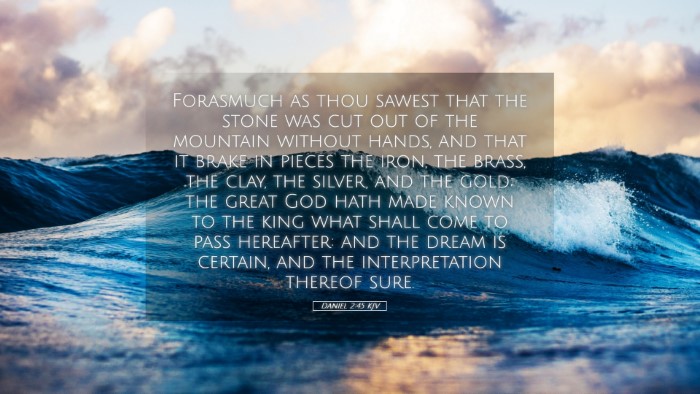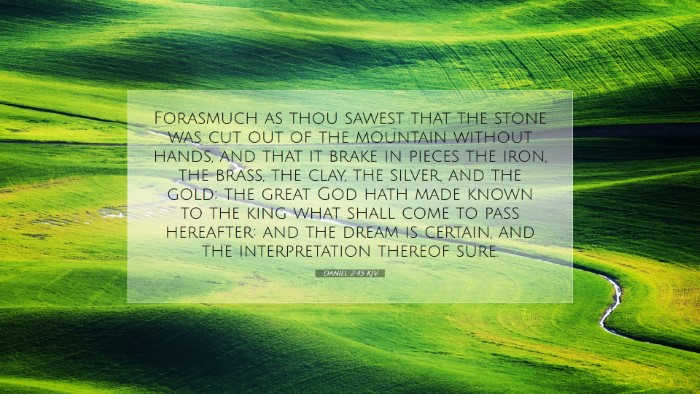Commentary on Daniel 2:45
Verse Overview
Daniel 2:45 states, "Forasmuch as thou sawest that the stone was cut out of the mountain without hands, and that it brake in pieces the iron, the brass, the clay, the silver, and the gold; the great God hath made known to the king what shall come to pass hereafter: and the dream is certain, and the interpretation thereof sure." This verse concludes Daniel's interpretation of King Nebuchadnezzar's dream, where the stone symbolizes God's eternal kingdom.
Insights from Public Domain Commentaries
Matthew Henry's Commentary
Matthew Henry emphasizes the significance of the stone, cut "without hands," suggesting God's divine intervention. He notes that this 'stone' represents the Messiah, who will establish a kingdom that will ultimately crush all earthly powers. This task reflects God’s sovereignty over human history, illustrating that all kingdoms will eventually yield to His authority.
Henry points out the implications of the ‘stone’ breaking the statue made of various materials. Each material represents different empires: the head of gold symbolizes Babylon, the chest and arms of silver represent Medo-Persia, the belly and thighs of brass signify Greece, and the legs of iron along with the feet of clay depict the Roman Empire. Henry asserts that although mankind strives for power and glory, God will ultimately triumph over all of them through Christ's everlasting kingdom.
Albert Barnes' Notes
Albert Barnes elaborates on the notion that the stone "cut out of the mountain" signifies not only Christ but also the establishment of His kingdom on earth. The mountain reflects the exalted nature of God's kingdom, contrasting human kingdoms that rise and fall. Barnes emphasizes that the stone's growth into a great mountain symbolizes the expansive and enduring nature of God's reign.
Barnes remarks that Daniel reassures Nebuchadnezzar about the certainty of the dream and its interpretation. The clarity with which God reveals the future empowers believers, indicating that despite immediate appearances, God's plan is unassailable. The destruction of the earthly kingdoms illustrates God's judgment against human pride and rebellion.
Adam Clarke's Commentary
Adam Clarke draws attention to the phrase "cut out of the mountain without hands," indicating a supernatural birth of the kingdom. Clarke interprets the "stone" as Christ, who initiates the new covenant and establishes a new order. He notes the critical importance of God's agency in this process, furthering the idea that human achievements are insignificant in God's overarching design.
Clarke also connects the breaking of the statue with the finality of God's judgment against successive regimes. He points out that while kings and empires may seem impregnable, they are ultimately transient, underscored by the symbolism of the stone overcoming them. This aspect acts as a caution to earthly rulers, reminding them of life's brevity and God’s eternal authority.
Theological Implications
This verse carries profound theological significance. It serves as a testament to the certainty of God's plans and His power to enact them in human history. The imagery of the stone signifies not merely a moment of destruction but an establishment of a new system—the Kingdom of God—characterized by justice, righteousness, and eternal peace.
Human Kingdom vs. Divine Kingdom
- Ephemeral Power: The passage serves as a reminder of the fragility of human achievements in the face of divine ability.
- God's Sovereignty: It highlights God's control over nations and history, assuring believers of His ultimate plan amidst chaos.
- Hope and Assurance: For believers, this text promises the advent of God's kingdom, urging them to maintain faith even as worldly powers may appear dominant.
Application for Believers
For modern-day Christians, Daniel 2:45 encourages hope in the face of adversity and the realities of a tumultuous world. Just as Daniel interpreted the dream in faith, believers are called to discern God's presence and purpose in their own lives. The assurance that God is sovereign provides comfort and inspires active participation in the establishment of His kingdom on earth through love, justice, and service.
Conclusion
In conclusion, Daniel 2:45 stands as a pivotal affirmation of God's sovereignty and the certainty of His eternal kingdom. Through the insights of Matthew Henry, Albert Barnes, and Adam Clarke, we glean a deeper understanding of the passage's implications for theology and application in the life of the believer. The stone, emblematic of Christ, signifies the transformative power of God's kingdom, inviting all to recognize His authority over earthly realms.


